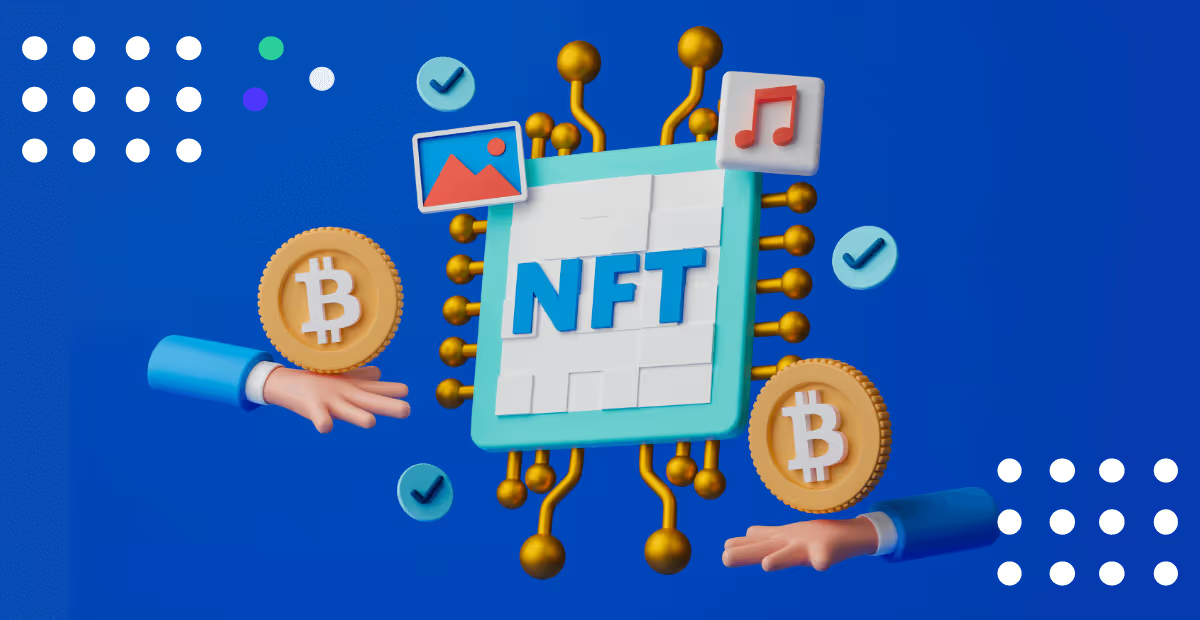The Growing Importance of NFTs and Challenges in Tracking Them
Non-Fungible Tokens (NFTs) have gained massive popularity in recent years due to their unique characteristics and applications in various industries, such as art, gaming, and collectibles. NFTs represent digital or physical assets with distinct properties, making them different from one another. As a result, NFTs are not interchangeable like cryptocurrencies or other fungible tokens.
As the NFT market expands, managing and tracking NFTs held in a wallet becomes increasingly important. Tracking NFTs manually can be a challenging and time-consuming task, especially for users who hold numerous NFTs with different characteristics. Furthermore, NFTs are typically linked to various smart contracts on a blockchain, adding to the complexity of tracking them.
In this blog post, we will explore how the Tatum SDK simplifies the process of retrieving all NFTs held by a wallet, making it easier for users to manage their assets.
Use Cases of the "Get All NFTs Held by a Wallet" Feature:
The ability to retrieve all NFTs held by a specific wallet address within a blockchain ecosystem offers various use cases and opportunities for developers. Let's explore some examples of how this feature can be utilized:
- Wallet Integration and Management: Wallet applications and platforms can leverage this feature to provide users with a comprehensive view of the NFTs held in their wallets. By retrieving and displaying all NFTs associated with a wallet address, users can easily manage, monitor, and track their digital collectibles in one centralized location.
- NFT Marketplaces: NFT marketplaces can utilize this feature to enhance the user experience and facilitate seamless trading. By retrieving the NFTs held by a wallet, marketplaces can offer personalized recommendations, tailored search results, and improved discovery of NFTs based on the user's existing collection.
- Portfolio Tracking and Valuation: NFT collectors and investors can benefit from this feature by gaining insights into their NFT portfolio's composition and valuation. By retrieving all NFTs held in their wallet, users can track the performance, rarity, and value of their digital assets, enabling them to make informed decisions regarding buying, selling, or holding specific NFTs.
- Gaming and Virtual Worlds: Developers of blockchain-based games and virtual worlds can leverage this feature to enhance player experiences. By retrieving the NFTs held in a player's wallet, game developers can enable in-game functionalities, rewards, or access based on the player's owned NFTs, creating unique gameplay opportunities and fostering engagement.
- NFT Aggregators and Discovery Platforms: Aggregator platforms that curate and showcase NFT collections can utilize this feature to offer comprehensive listings and discovery tools. By retrieving NFTs from various wallet addresses, aggregators can provide users with a centralized hub for exploring and discovering NFTs across multiple platforms and collections.
- NFT Analytics and Research: Researchers and analysts can utilize this feature to gather data and insights about the NFT ecosystem. By retrieving NFTs held in different wallets, analysts can study trends, ownership patterns, market dynamics, and user behavior, facilitating in-depth analysis and informed decision-making.
Why Use Tatum SDK for NFT Management
Tatum SDK offers several advantages for NFT management:
- Easy to use: The SDK provides a simple and intuitive interface for developers, making it easy to retrieve NFT information without needing deep knowledge of blockchain and smart contract interactions.
- Versatile: Tatum SDK supports various blockchain networks, making it compatible with a wide range of NFT standards and platforms.
- Scalable: The SDK is built to handle the increasing number of NFTs in a wallet efficiently, allowing users to manage their assets effectively.
- Secure: Tatum SDK ensures secure interactions with blockchain networks and smart contracts, safeguarding users' assets.
Using Tatum SDK to Retrieve All NFTs Held by a Wallet
The Tatum SDK (@tatumcom/js) provides an efficient way to retrieve all NFTs held by a wallet. It offers an easy-to-use interface for interacting with blockchain networks and smart contracts, allowing developers to access wallet NFT information without needing to understand the underlying complexities.
Here's an example of how to initialize the Tatum SDK and retrieve all NFTs held by a wallet:
This example demonstrates how the Tatum SDK simplifies the process of retrieving NFT information by abstracting the complexities of blockchain and smart contract interactions.
To simplify the process of managing and tracking NFTs held by a wallet, developers can leverage the Tatum SDK for efficient and reliable NFT management.
[.c-text-center]Start Building Apps the Quick Way With Tatum[.c-text-center]
[.c-wr-center][.c-copy-card][.c-copy-top][.c-copy-hex]npm i @tatumio/tatum[.c-copy-hex][.c-copy-top][$r-copy-to-clipboard=npm i @tatumio/tatum][.c-copy-icon][.c-copy-icon][$r-copy-to-clipboard][.c-tooltip]Copied![.c-tooltip][.c-copy-card][.button-blue-post]Get started[.button-blue-post][.c-wr-center]
By integrating the Tatum SDK into your project, you can provide a seamless NFT management experience for your users, helping them keep track of their unique digital assets without the complexities of manual tracking or interacting with blockchain networks and smart contracts. Don't wait, get started with the Tatum SDK today!
[.c-wr-left][.button-black]Visit GitHub[.button-black][.button-out]Read Docs[.button-out][.c-wr-left]

